The city of Hebron, in the South of the West Bank is historic, beautiful and troubled. I and a friend arrived somewhat miraculously after a trecherous journey through Wadi Nar, Fire Valley, the only road which connects the South to the rest of the West Bank (for Palestinians- Israelis are given a safer bi-pass road to use). It consists of a thin threading road which loops perilously around its sun baked hills, clinging to the side of the slopes which lead to Bethlehem. Our time of travel happened to coincide exactly with a freak rainstorm, almost unheard of in May.
So the road's surface quickly turned in to an oil slick and within a couple of minutes we were in sight of its first casualty, a bus which had slid off the side of the road and toppled over. A km or so ahead, a line of traffic stood stacked up, waiting for trucks and lorries to lumber down the valley, crowding the road.
One of the most endearing qualities of the Palestininian people is their very loose embrace with concepts of time. Rushing around madly like us Brits is completely incomprehensible to them; afternoons and evenings can be happily whiled away sipping shai in the garden or talking politics on street corners. Telling someone "I'm sorry I have to be going" will inevitably cause disappointment, and generate confused and furrowed brows- for each other, people here have all the time in the world.
However, put a Palestinian behind the wheel of a car and a different story emerges. This day. on the perilously narrow and slippery road which was fast turning in to a river, the only careful drivers were the clumsy lorries edging their way round the loops and bends towards the bottom of the valley. Chaos ensued when oncoming traffic, horns blaring, formed not one, or two, but three layers of cars all trying to take each other over in a reckless bid to round the corner on the steeply inclined road. Wheels started spinning as some of the cars started sliding backwards down the road towards us. Our judicious driver quickly formed lane number four and sped us up the wrong side of the road, pass the mess of metal and steamy windows.
When we made it to the top of the hill I nearly launched my diatribe of how great it was that the British knew how to queue- but hell, who am I to cast stones. Shortly after that we replaced our waning blood sugar levels at a nearby cake shop in Bethlehem and drove on to Hebron, smiling with relief.
Approaching the city, the ubiquitous settlements lay sprawled across the nearby hills with their regular shaped red roofed houses, swimming pools and services, modern and clean. A few miles further on, barricades, barbed wire and disused checkpoints marked the beginnings of the shabby suburbs of Hebron . Nothing new here except perhaps the size and proximity of the encroaching illegal settlements, built on confiscated Palestinian land and feeding off its natural resources, much needed by the local population.
However once inside the old city things were different. Within the old city, about two hundred Israeli settlers have etablished themeselves in small enclaves. Most of their living quarters are confiscated Palestinian homes, some have built homes on top of these houses above the narrow streets of the old Souq, market. So this provides a perfect vantage point for them to throw rubbish, stones and other objects upon the heads of the poor local Palestinian people trying to do their shopping a couple of floors below. Above our heads were a system of nets and wires, put up by the locals in a sad-looking attempt to protect themseleves and their children from the objects lobbed at them by settlers.
To protect and provide 'security' for these two hundred illegal settlers are around 2000 Israeli soldiers, as well as a system of checkpoints and barricades within the heart of the old city. We walked through the shadowy and silent streets of the old market. The shop fronts were all padlocked up, aside from the odd stall or two. "This is because the shopkeepers here were being harrassed so much by the settlers and the soldiers", Ali told us. "They were too afraid, they all left. Ten years ago these streets used to be busy, alive with people. But now there's nothing"
We passed through a checkpoint built in to the old stone walls, a turnstile, a metal detector, a narrow passageway leading towards daylight and a few soldiers waiting by the exit. This was the Palestininan entrance to the city's main mosque.
At a nearby barrier we chanced an interchange with a soldier, a young women who had approached us to 'check' what we were doing.
"Where are you from?" She asked. So we asked her the same question.
"I'm from Haifa." She said. I asked her how long women were obliged to do military service.
"Two years, same as men. More if we are called up again." That's a really long time.
"Is it worth it?" I asked. "Would you do it for your country?" she replied.
Well, if it actually was my country, I thought. And no, I wouldn't anyway! But of course I thought better than to get embroiled in politics on a street corner with a soldier, and instead politely asked permission to take a few photos of the deserted streets with their Star of David buntings flapping pathetically in the wind.
We later went to visit some volunteers from the Christian Peacemakers Team who have maintained a presence in Hebron since 1994. During this time they have monitored checkpoints and accompanied Palestininan children to school, who would be otherwise subject to attacks, threats and other abusive behaviour from the settlers. From the rooftop of the CPT's apartment, we were given a clearer picture of how the city was divided by the Israelis. A soldier paraded a nearby rooftop. The houses next door, now mostly empty, still contained a few residents. The front of these people's houses face a road which is opposite a large cemetary. This road has now been designated for Israeli use only. So the residents are no longer able to use the front door of their own houses, and are instead forced to use ladders to climb up to the back doors or window of their own houses, some having to pass through the inside of their neighbours' houses in order to reach their own. The CPT told me that they sometimes found people praying outside their front door, as this was the closest that these poor people were able to get to the graves of their deceased relatives.
As a thanks for this valuable work, members of the CPT have been kicked, spat on and on two occasions hospitalised by settlers whilst walking through the streets.
From what I saw in the short time I spent in Hebron, this was Occupation in its most unabated, unabashed and vicious form, making daily lives miserable and in many cases impossible for the people of this ancient and beautiful city.
Subscribe to:
Post Comments (Atom)
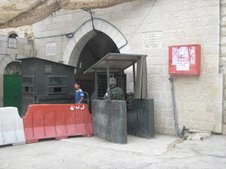
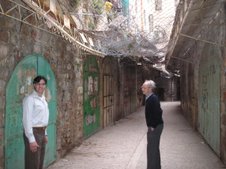
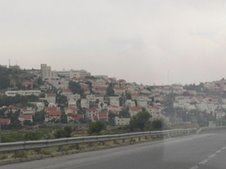
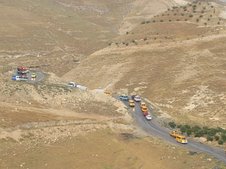

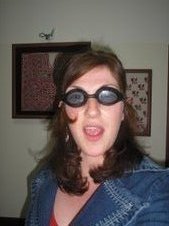
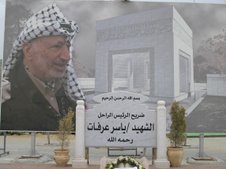

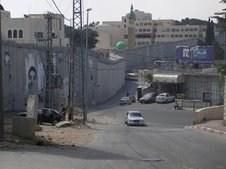




No comments:
Post a Comment